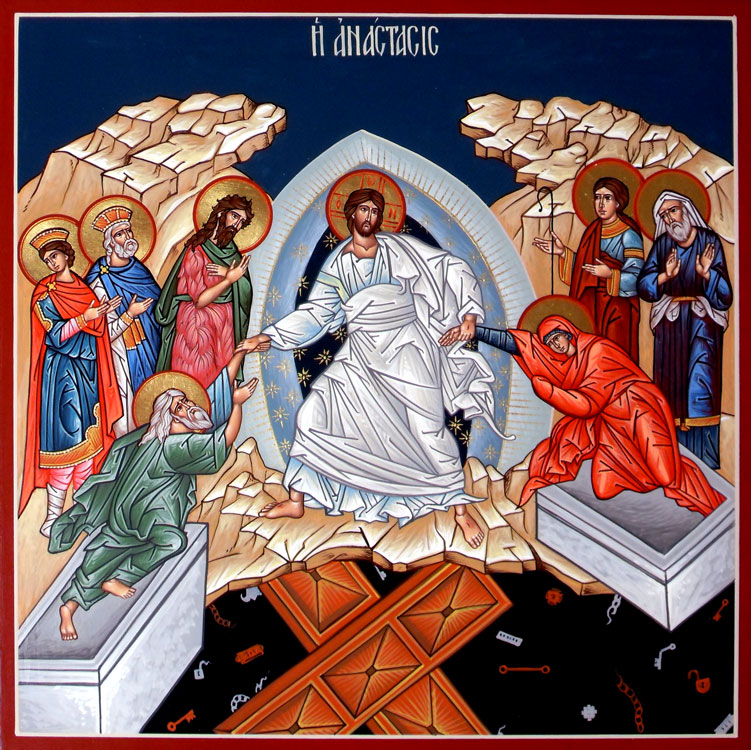From the Prophet Jeremiah:
I will put my law within them, and I will write it on their hearts; and I will be their God, and they shall be my people. No longer shall they teach one another, or say to each other, “Know the Lord”, for they shall all know me, from the least of them to the greatest, says the Lord; for I will forgive their iniquity, and remember their sin no more.
(From the Daily Office Lectionary – Jeremiah 31:33b-34 (NRSV) – June 6, 2014)
 Can the finite ever truly know the infinite? Can the human mind ever fully grasp the knowledge of God? We have the assurance of Jeremiah’s prophecy, the consolation of God spoken through “the weeping prophet” that it can. And Jeremiah is not alone.
Can the finite ever truly know the infinite? Can the human mind ever fully grasp the knowledge of God? We have the assurance of Jeremiah’s prophecy, the consolation of God spoken through “the weeping prophet” that it can. And Jeremiah is not alone.
Whenever I read a verse of scripture that speaks of the knowledge of God, I remember a favorite hymn of the rector under whom I served as curate, God Is Working His Purpose Out, sung to the tune Purpose. A repeating text in the hymn, not quite a chorus, is “the earth shall be filled with the glory of God as the waters cover the sea.” It is based on a verse from the prophet Habakkuk: “The earth will be filled with the knowledge of the glory of the Lord, as the waters cover the sea.” (Hab 2:14)
Like Jeremiah, Habakkuk assures us that the time will come when finite human beings will know the infinite Lord. Habakkuk focuses on the overwhelming universality of this knowledge, “as the waters cover the sea,” while Jeremiah focuses on its intimacy, “I will write it on their hearts.” It is Jeremiah’s intimacy that is echoed by Paul in his famous essay on love in the thirteenth chapter of the first letter to the Church in Corinth where we find yet another assurance that despite our limitations we will come to full knowledge of God:
For we know only in part, and we prophesy only in part; but when the complete comes, the partial will come to an end. When I was a child, I spoke like a child, I thought like a child, I reasoned like a child; when I became an adult, I put an end to childish ways. For now we see in a mirror, dimly, but then we will see face to face. Now I know only in part; then I will know fully, even as I have been fully known. And now faith, hope, and love abide, these three; and the greatest of these is love. (1 Cor 13:9-13)
Paul links knowledge of God to love using the Greek word agape, that word so poorly translated by our English word “love.” Agape is unconditional, non-judging love which places demands not on the beloved, but on the lover; it requires the lover (as Nazarene theologian Thomas Oord has noted) to act intentionally to promote well-being even, or perhaps especially, when responding to that which creates ill-being. Linking universal but intimate knowledge of God to agape, Paul places a burden on every follower of Christ.
The prophets’ assurance that all will know God, that the universal but intimate knowledge of the Almighty will cover the earth and also be written on individual hearts begs the question of how. Paul’s linkage answers that question: through the ministry of the members of the church. As the Episcopal Catechism says, “The mission of the Church is to restore all people to unity with God and each other in Christ” through the ministry of God’s people. My old boss’s favorite hymn says it more poetically:
What can we do to work God’s work,
to prosper and increase
the brotherhood of all mankind —
the reign of the Prince of Peace?
What can we do to hasten the time —
the time that shall surely be,
when the earth shall be filled
with the glory of God
as the waters cover the sea.March we forth in the strength of God,
with the banner of Christ unfurled,
that the light of the glorious gospel of truth
may shine throughout the world:
fight we the fight with sorrow and sin
to set their captives free,
that earth may filled
with the glory of God
as the waters cover the sea.
On this 70th anniversary of D-Day, marching forth under the banner of Christ fighting sorrow and sin and setting captives free seems an appropriate metaphor for our ministry. God’s instrument for flooding the world with knowledge, for writing it on the hearts of human beings, is the Church, whose members are called “to bear witness to him wherever they may be; and, according to the gifts given them, to carry on Christ’s work of reconciliation in the world.” (BCP 1979, page 855) March forth, Church, march forth!
====================
A request to my readers: I’m trying to build the readership of this blog and I’d very much appreciate your help in doing so. If you find something here that is of value, please share it with others. If you are on Facebook, “like” the posts on your page so others can see them. If you are following me on Twitter, please “retweet” the notices of these meditations. If you have a blog of your own, please include mine in your links (a favor I will gladly reciprocate). Many thanks!
====================
Father Funston is the rector of St. Paul’s Episcopal Church, Medina, Ohio.
 “I threw it into the fire, and out came this calf!”
“I threw it into the fire, and out came this calf!” I think I know what Paul is trying to say here, but I don’t like the way he’s saying it. I mean, I really have a theological issue with the assertion that “flesh and blood cannot inherit the kingdom of God.” I think the statement is just plain wrong. It states a dualism that relegates the material, specifically the human body, to realm of the damned, the unclean, the unworthy. In light of a creation story in which the Creator “saw everything that he had made [including that human flesh and blood], and indeed, it was very good,” I cannot accept the condemnation of our material being.
I think I know what Paul is trying to say here, but I don’t like the way he’s saying it. I mean, I really have a theological issue with the assertion that “flesh and blood cannot inherit the kingdom of God.” I think the statement is just plain wrong. It states a dualism that relegates the material, specifically the human body, to realm of the damned, the unclean, the unworthy. In light of a creation story in which the Creator “saw everything that he had made [including that human flesh and blood], and indeed, it was very good,” I cannot accept the condemnation of our material being. Two weeks before Easter I came down with the flu. I spent three days in bed with a high fever, a racking cough, and a good deal of body aches and pains. A friend who suffered the same illness (it’s gone around our town and several people have suffered through it) described the muscle pain as feeling as if one had been beaten up, thrown the ground, and kicked several times. It felt to me as if every square centimeter of connective tissue in my body was inflamed at the same time. (This is the first time in a couple of weeks or more that I’ve had enough morning energy to write anything after reading the daily lessons.)
Two weeks before Easter I came down with the flu. I spent three days in bed with a high fever, a racking cough, and a good deal of body aches and pains. A friend who suffered the same illness (it’s gone around our town and several people have suffered through it) described the muscle pain as feeling as if one had been beaten up, thrown the ground, and kicked several times. It felt to me as if every square centimeter of connective tissue in my body was inflamed at the same time. (This is the first time in a couple of weeks or more that I’ve had enough morning energy to write anything after reading the daily lessons.) Several days ago, as I was reading again the Easter story and the sections of the Holy Scriptures appointed for this year, I had the radio on and tuned to my favorite oldies station.
Several days ago, as I was reading again the Easter story and the sections of the Holy Scriptures appointed for this year, I had the radio on and tuned to my favorite oldies station. In the Eastern Orthodox tradition, icons of the Resurrection depict Christ rising from the tomb with a whole crowd of people. To one side of him crowned and haloed are King David and King Solomon; on the other, we see Abel the first martyr of creation carrying a shepherd’s crook and Moses the first prophet of the Old Covenant. Also present is John the Baptist, who is both the first prophet and the first martyr of the New Covenant. Beneath Christ’s feet, the gates of hell lie broken, often forming a cross. And from two tombs, Adam and Eve are rising, but not of their own accord; Jesus holds them by the wrists and is pulling them from their graves.
In the Eastern Orthodox tradition, icons of the Resurrection depict Christ rising from the tomb with a whole crowd of people. To one side of him crowned and haloed are King David and King Solomon; on the other, we see Abel the first martyr of creation carrying a shepherd’s crook and Moses the first prophet of the Old Covenant. Also present is John the Baptist, who is both the first prophet and the first martyr of the New Covenant. Beneath Christ’s feet, the gates of hell lie broken, often forming a cross. And from two tombs, Adam and Eve are rising, but not of their own accord; Jesus holds them by the wrists and is pulling them from their graves.  There are six Greek words translated “love” in English: eros (sexual passion), philia (deep friendship), ludus (playful love), pragma (longstanding or mature love), philautia (self love), and agape (unconditional or selfless love). It is the sixth which Paul uses here and which is used extensively throughout the New Testament and in early Christian texts.
There are six Greek words translated “love” in English: eros (sexual passion), philia (deep friendship), ludus (playful love), pragma (longstanding or mature love), philautia (self love), and agape (unconditional or selfless love). It is the sixth which Paul uses here and which is used extensively throughout the New Testament and in early Christian texts. The “body analogy” is so deeply engrained in Christian theology through Paul’s use of it in his epistle to the Corinthians and elsewhere that it may be heresy to suggest that its usefulness in the modern world may have come to an end. It was, perhaps, an apt description of the church in a time when church communities were small and close-knit, but does it work in the modern age of the mega-church, or in an age of decentralization?
The “body analogy” is so deeply engrained in Christian theology through Paul’s use of it in his epistle to the Corinthians and elsewhere that it may be heresy to suggest that its usefulness in the modern world may have come to an end. It was, perhaps, an apt description of the church in a time when church communities were small and close-knit, but does it work in the modern age of the mega-church, or in an age of decentralization? The genius of Paul is his holistic approach to understanding the gifts of the Spirit, the talents and skills of human beings. Yes, he says, there are all sorts of talents and skills, but they all come from the same source – God the Spirit – and they are all to be used for the same purpose – building up the community. It is a genius that is lost in the modern world, I’m sorry to say.
The genius of Paul is his holistic approach to understanding the gifts of the Spirit, the talents and skills of human beings. Yes, he says, there are all sorts of talents and skills, but they all come from the same source – God the Spirit – and they are all to be used for the same purpose – building up the community. It is a genius that is lost in the modern world, I’m sorry to say.  A couple of months ago, a friend mine published a list of the
A couple of months ago, a friend mine published a list of the  This is one of those times (there are, I admit, quite a few) when Paul loses me! I step back from his words and say, “Really? What?” Is Paul seriously equating sex with a prostitute with marriage? I know that Paul didn’t have too high an opinion of marriage. In the next chapter he will say that he thinks staying single is a much better idea: “I wish that all men were even as I myself am. . . . I say to the unmarried and to widows that it is good for them if they remain even as I.” (1 Cor. 7:7,8) But does he really hold it in such low regard so as to equate it with prostitution?
This is one of those times (there are, I admit, quite a few) when Paul loses me! I step back from his words and say, “Really? What?” Is Paul seriously equating sex with a prostitute with marriage? I know that Paul didn’t have too high an opinion of marriage. In the next chapter he will say that he thinks staying single is a much better idea: “I wish that all men were even as I myself am. . . . I say to the unmarried and to widows that it is good for them if they remain even as I.” (1 Cor. 7:7,8) But does he really hold it in such low regard so as to equate it with prostitution?

